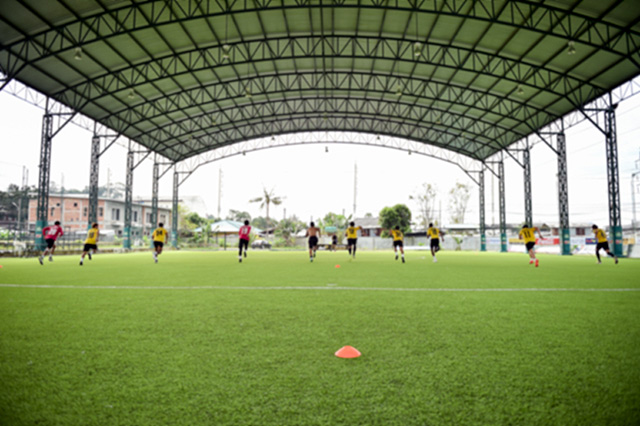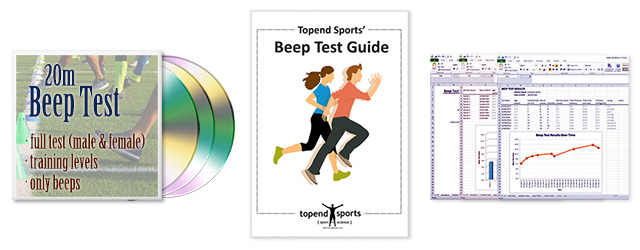As one of the most popular fitness tests used around the world, the 20m multi-stage shuttle run "beep" test has been the subject of many research studies. During our many years of writing about the beep test on this website, we have come up with several ideas for research projects involving the test.
 soccer team running the beep test undercover
soccer team running the beep test undercoverState of Mind
We know that a player's state of mind can affect any maximal exercise test result, though it has not been closely studied in respect to the beep test. The beep test protocol states that the participants should be strongly encouraged to perform maximally. What actual difference does this make? What if there were no instructions at the start of the test, or the test was performed without their teammates around. What difference does a practice test make? You could compare results with and without psychological interventions such as pre-test sessions in mental imagery and goal setting. Do females or certain individuals respond better to some of these psychological interventions?
Does the feedback of the levels of the test being announced influence the result? It would be interesting to perform the beep test with and without the level numbers on the recording to see if it makes a difference. We have created an audio file just like this, which can be used.
Environmental Conditions
When living in the tropical north of Australia I conducted preliminary research on the effect of the hot climate on field fitness testing results. The results from fitness testing performed outdoors may be detrimentally affected by the environmental conditions, reducing the reliability and validity of the tests, and could make it difficult to compare to test results performed in other conditions and also to testing performed indoors. The effect of changes to the environmental conditions would be expected to differ between different types of tests, with a maximal effort test like the beep test expected to be affected greatly.
Radiant heat may make a big difference to beep test results. Compare results in and out of the shade, inside and outside. Such a study only requires two test sessions: the Beep test is performed on the track twice, once under a shade cloth, the other in direct sun. The testing order is randomized. Maybe also look at the effect of different types of clothing.
Studies of environmental conditions would benefit by additional measures of heart rate, skin and core temperature, sweat rate and composition.
Hearing Impaired Athletes
I am unaware of any fitness tests designed specifically for the deaf (though there is one for the visually impaired). Although deaf people can perform many fitness tests without modification, a very common test of aerobic fitness, the beep test, relies on audio signals so is not easy for deaf people to take part. One such modification would be using visual clues to indicate the time to turn, and the changes in pace. Once you create the modified testing equipment, it will need to be validated. You will need access to some deaf athletes too.
Related Pages
- List of References — a selection of research papers relating to the 20m multistage fitness test.
- Fitness Testing Science Fair Projects
- More Sport Science Research Project Ideas
- Free download of the beep test mp3
- Maximizing Your Score — to get the most out of the beep test.
- Guide to variations of the beep / bleep test
- Test Procedure — Detailed instructions for conducting the beep test. Also video examples.
- Fitness tests which are modified beep tests
- Purchasing the beep test cd
- What's your best score? some results of athletes
- Beep Shuttle Listing — a listing of the number of runs for each level.
- Beep Test Software — provides the standard Multistage Fitness Test or Bleep Test right on your PC or Laptop, with many additional features.
BEEP TEST PACKAGE - only $10
The 20m Beep Test (male & female voices) + Training Levels + 'Beeps Only' track + Excel Spreadsheet + eBook Guide (PARQ, consent form, test recording sheet, warm-up, tips, norms + much more!)

The ultimate beep test package, including two versions of the beep test audio file (male and female voice), an audio track with only the beeps (no voices), 8 audio tracks for training at specific test levels, an Excel spreadsheet with an offline calculator and tables for recording, analyzing and presenting results, a 12-page eBook beep test guide which includes a PARQ, informed consent form, and test recording sheet plus much more. All these files are available individually for $5 each, or even better get them all for $10. Check out the details.


 Current Events
Current Events